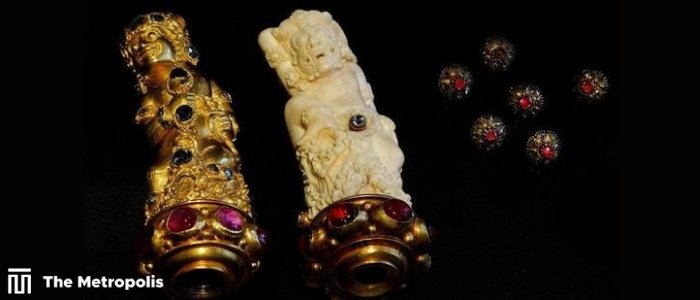The “Lombok Treasure”, looted by Dutch soldiers in 1894 is being returned to Indonesia (Photo: Getty Image)
Metropolis Desk-
Hundreds of priceless artifacts that the Netherlands stole from Indonesia and Sri Lanka during its colonial era will soon be returned.
A bronze cannon covered in gems and a stockpile of stolen diamonds from the “Lombok treasure” are among the items that need to be restored.
According to a report, the government should comply with requests to return goods.
As the Netherlands increasingly addresses its colonial heritage, the agreed-upon reparation is timely.
In recent years, several nations have started returning priceless looted artifacts. Examples include the signing over by British and German museums of some of the so-called Benin Bronzes that were taken from Nigeria during a significant British military expedition in 1897.
“[This is] the first time that we are returning objects that should never have been in the Netherlands,” said Culture Minister Gunay Uslu.
“However, we do more than merely provide items. In actuality, we are beginning a phase of more active cooperation with Sri Lanka and Indonesia.
The so-called “Lombok treasure,” a cache of gems, precious stones, gold, and silver that the Dutch colonial force took from a royal castle on Indonesia’s Lombok Island in 1894, is one of the items that will be returned to Indonesia.
A beautifully decorated 18th-century bronze cannon said to have been a gift from a Sri Lankan aristocrat to the King of Kandy in the 1740s and currently on exhibit in Amsterdam’s Rijksmuseum, will be returned to Sri Lanka.
When Dutch troops assaulted and took control of the Sri Lankan kingdom of Kandy in 1765, it is thought that the cannon ended up in their possession.
Uslu, the minister of culture, claimed that the government was following the suggestions made in a 2020 study by a Dutch committee looking into art acquired during the colonial era.
The committee recommended the government be “willing to return unconditionally” any cultural items taken from former Dutch colonies if the source nation made a request.
The report stated that the Netherlands must take accountability for its colonial past by making the acknowledgment and repair of this wrong a fundamental tenet of the policy on colonial collections.
In recent years, the nation has been publicly debating its legacy.
King Willem-Alexander apologized in writing for the Netherlands’ participation in the slave trade on Saturday, expressing how “personally and intensely” it affected him.
After the 17th century, the nation established itself as a major colonial power with possession of territories around the world, and Dutch slave dealers sold more than 600,000 people into slavery.
Source- BBC News



